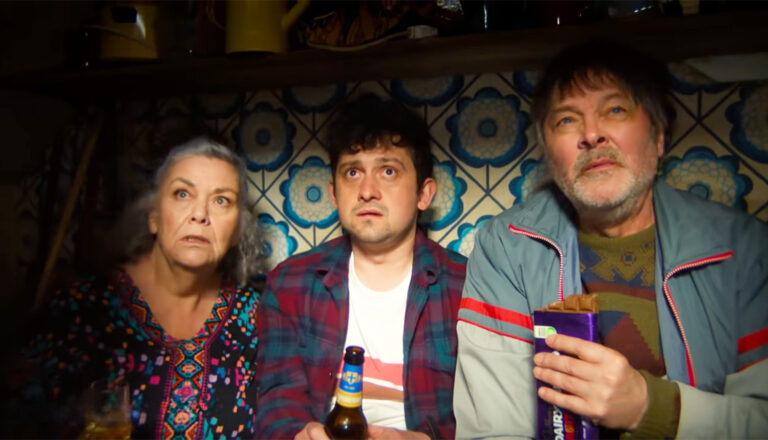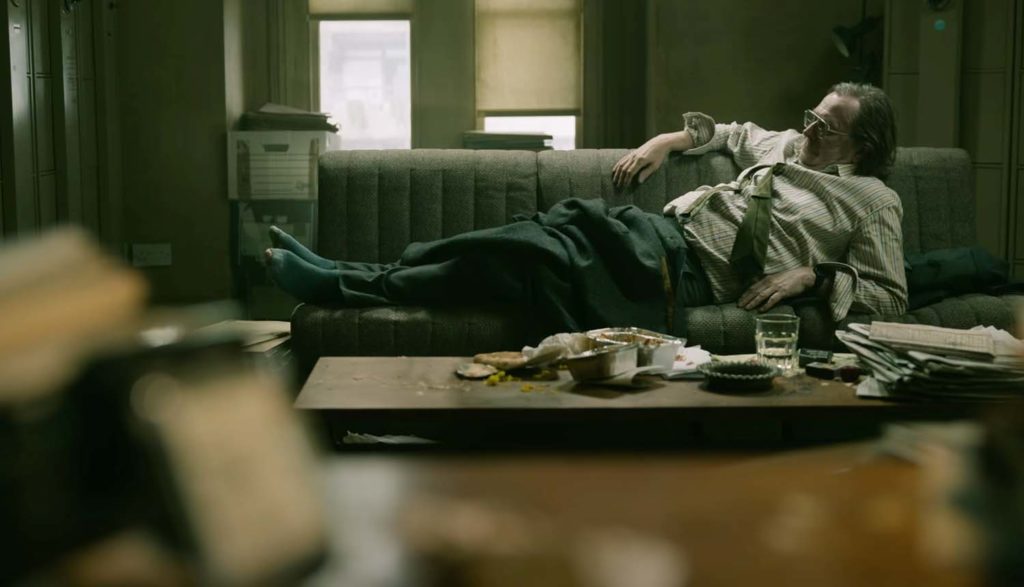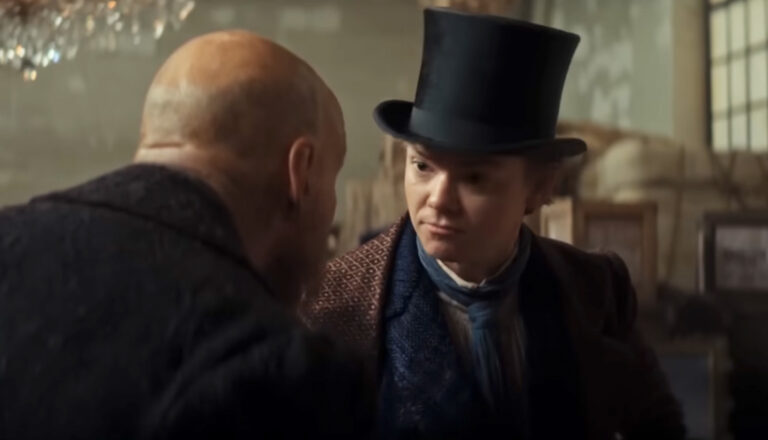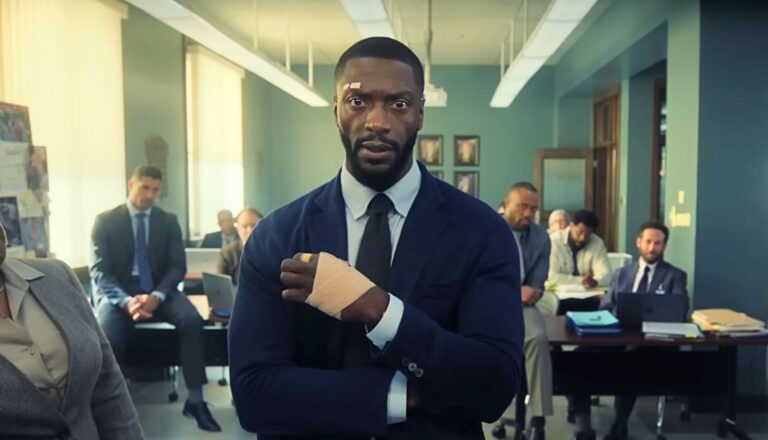
Can You Keep a Secret?
Liars prosper in ‘Can You Keep a Secret?’ on Paramount+ as Debbie Fendon pretends her husband is dead to keep his life-insurance money.

River Cartwright was all set for a brilliant career in Britain’s vaunted MI5. He’s smart. Driven. Clever. His grandfather was a legendary agent himself, which means he’s already got friends—or, at least, friends of relatives—in high places.
And then he accidentally gets 149 people killed.
OK, so the “fatalities” were part of a training exercise. Still, River didn’t exactly do himself any favors. MI5—at least the traditional, glamorous part of MI5—wants nothing to do with River for now, and it doesn’t care who his grandfather is. But it can’t exactly kick the agent to the curb, can it?
So the agency shoves him into Slough House, where it keeps all of its useless-but-still-somehow-operational agents. And it’s headed by a man whose sole purpose seems to make sure that no actual police work is done.
That man is Jackson Lamb, a bureaucrat whose main skills seem to be flatulence, drinking and making his charges miserable. When River asks why Lamb’s making him comb through the trash of a little-known extremist journalist, Lamb answers directly: “It’s because I don’t like you and I want you to quit.”
He’d seem to like everyone to quit, just like he has. He goads Catherine, his long-suffering, recovering-alcoholic assistant, with glasses of booze. He insults everyone who comes into his office. When the Slough House team gathers around a bank of computer monitors to watch a hostage crisis unfold on YouTube, Lamb tells them they should return to their desks and get back to what they were doing: that is, absolutely nothing.
But that hostage situation just may be connected to that weird trash pile that River’s going through. River suspects as much, anyway. And even if he’s in Slough House, he’s also still MI5, and thus legally and ethically obligated to protect Britain and sniff out any threats to it—in this case, given the ripeness of the trash, literally.
River’s fellow Slough House agents may be mostly useless, but they’ve taken the same oath. Most feel that twinge of duty, deep down. And it just might be possible that Lamb isn’t quite as checked out as he appears.
Apple TV+ is as hot as a counterfeit 50-pound note. It doesn’t release nearly as much new content as Netflix or Prime Video; it doesn’t have nearly the collection of superheroes and Jedi as Disney+. But it does have awards: plenty of them. Ted Lasso won seven Emmys in 2021. Apple TV+’s CODA won all three Oscars for which it was nominated in 2022. In fact, it became the first movie released by a streaming service to win the night’s biggest prize: Best Picture.
Five days after CODA’s Oscar upset, Apple TV+ released Slow Horses, a television series thriller based on Mick Herron’s sardonic book of the same name. And it handed the plum role of Jackson Lamb to Oscar winner Gary Oldman.
Big things are expected from this series, clearly. And in some ways, Slow Horses meets those expectations. Both gripping and funny (in a rather dark, bleak, British sort of way), the show has a 94% “freshness” rating on Rotten Tomatoes (as of this writing).
But for a show about spooks and plenty of redacted, censored secrets, Slow Horses certainly didn’t censor its language.
Each episode features enough f-words to fill the Thames. Scads of other profanities, obscenities, British crudities and demeaning racial slurs float down the river as well, making this as discomfiting watch as it is engaging.
The show isn’t free from other problems, either. As mentioned, Lamb’s drinking habits are out of hand. His personal hygiene is highly questionable. He sleeps on his office couch and wakes every morning to the sound of himself passing gas.
And while the show hasn’t been particularly gory yet, this is a thriller: Characters die and are injured, and threats of violence—up to and including decapitation—are never far away.
Despite the acclaim, for many, these Slow Horses can’t gallop away fast enough.
After prospective MI5 agent River Cartwright fails miserably during a training exercise, he’s sent to Slough House, where the agency keeps its most useless employees. Jackson Lamb seems determined to keep them useless. But when fellow Slough House agent Sid snags a thumb drive from a paranoid right-wing journalist, River suspects that it might be connected with some actual police work.
A man is beaten savagely before being tossed in the back of a van. Later, the kidnappers—who are affiliated with an extremist, racist group called the Sons of Albion—post a picture of their captive online, telling the world they’ll be cutting off his head in 24 hours.
We see River’s failed training exercise, wherein he knocks a police officer off his feet and throws him to the ground as he pursues his suspect. He and the suspect both jostle others, but River doesn’t catch the fleeing suspect in time. The suspect pushes a button, and a bright light goes off. We learn that had the threat been real, nearly 150 people would’ve died, and more than 200 would’ve been injured. We also see flashbacks of an apparent suicide. And River burns his hand on a “flashbox,” a box designed to hold a laptop or computer tablet with sensitive information on it.
Jackson Lamb wakes up after spending the night, apparently, on his office couch—his alarm being his own flatulence. His coffee table supports beer and whisky; he lights a cigarette as soon as he wakes up (and smokes throughout the episode). Booze bottles, both half-filled and emptied, seem to be his office’s prime decor. Ironically, he takes drinking jabs at his assistant, who later attends an Alcoholics Anonymous meeting.
A comedian makes a number of offensive religious jokes as part of his standup act, including one about “Jesus, Buddha and Allah walk(ing) into a pub,” and another making fun of Jesus’ crucifixion. River’s grandfather makes a reference to serving his time until his “sins are forgiven,” while Lamb tells River that he should’ve “skipped this Purgatory (meaning Slough House) and gone straight to h—.” A politician rails at immigrants.
We hear other profanities, too, including 25 f-words and seven s-words. Characters also say “a–,” “crap,” “p-ss,” “d–k” and the British profanity “bloody.” God’s name is misused once, and Jesus’ name is abused four times.
As MI5 seeks to find the hostage before his extremist kidnappers kill him, River and fellow agent Sid try to figure out if a right-wing journalist has any connection to the kidnappings. Meanwhile, as River and Sid spy on the journalist, Diana Taverner—MI5’s second in command—seems to be spying on Slough House.
The episode opens in the kidnappers’ hideout, where the extremists insult various ethnic groups and nationalities while gleefully anticipating tomorrow’s execution. One goes down to the basement to threaten the hostage, and later he takes a bucket for the man to go to the bathroom in. (There’s a suggestion that the man, of Middle Eastern descent and someone whose parents are Muslim, would somehow sully the house’s actual bathroom.) When the hostage tells one of his captors that he was born in Britain, the captor says, “Jesus was born in a stable. Don’t make him a f—ing donkey.”
A masked assailant struggles with someone and shoots an agent in the head. We see the agent bleed profusely from the injury, but it’s not clear by episode’s end whether it was a fatal shot. A booby trap burns through a laptop and sets an apartment on fire. A kidnapper talks about how many people he’s killed. He knows of five for sure. “Watched the life drain out of their eyes.” He suspects that he might’ve killed eight or nine others. “Sometimes you don’t stop to count.”
Jackson Lamb waves away the stench after he passes gas. His assistant, Catherine, knows that he must be worried about something: “It’s mid-morning and you haven’t had a drink yet,” she marvels. (He responds by telling the alcoholic that in days gone by, she’d be on her “third stomach pump by now.”) He tells Catherine to tie River to his desk by his testicles (using a much cruder term), so he doesn’t go out wandering. An IT expert at Slough House refers to himself as somewhere between “an emperor and a god.” He calls police “pigs,” even though he’s technically one of them.
Someone orders a vodka soda at a pub. Characters smoke. Several people seem to lie.
Characters say the f-word about 20 times and the s-word another nine. We also hear plenty of others, including “b–ch,” “b–tard,” “h—,” “tw-t,” “b–locks,” “pr–k,” “p-ss” and the British profanity “bloody.” God’s name is misused three times, and Jesus’ name is abused another four.

Paul Asay has been part of the Plugged In staff since 2007, watching and reviewing roughly 15 quintillion movies and television shows. He’s written for a number of other publications, too, including Time, The Washington Post and Christianity Today. The author of several books, Paul loves to find spirituality in unexpected places, including popular entertainment, and he loves all things superhero. His vices include James Bond films, Mountain Dew and terrible B-grade movies. He’s married, has two children and a neurotic dog, runs marathons on occasion and hopes to someday own his own tuxedo. Feel free to follow him on Twitter @AsayPaul.

Liars prosper in ‘Can You Keep a Secret?’ on Paramount+ as Debbie Fendon pretends her husband is dead to keep his life-insurance money.

Filled with gritty violence and foul language, when it comes to this German spy drama, “unfamiliar” is how most viewers should stay.

Oliver Twist’s Artful Dodger isn’t 13 anymore: He’s an adult. And being an adult comes with more grown-up problems.

Though it’s compelling, the content concerns in Prime Video’s ‘Cross’ might be enough to cross it off your watch list.